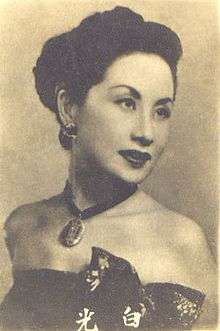Bai Guang
| Bai Guang | |
|---|---|
 | |
| Chinese name | 白光 |
| Pinyin | Bái Guāng (Mandarin) |
| Jyutping | baak6 gwong1 (Cantonese) |
| Birth name | Shǐ Yǒngfēn (史永芬) |
| Origin | China |
| Born |
June 27, 1921 Beijing, China |
| Died |
August 27, 1999 (aged 78) Kuala Lumpur, Malaysia |
| Resting place | Semenyih, Malaysia |
| Occupation | Actress, singer |
| Genre(s) | Shidaiqu, Mandopop |
| Years active | 1943-1959 |
Bai Guang (born Shi Yongfen; June 27, 1921, Beiping, now Beijing, China – August 27, 1999 in Kuala Lumpur, Malaysia) was a famous movie star and singer. By the 1940s, she became one of the Seven great singing stars.[1]
Biography
In her early years, Bai was a student of the Beiping Salon Theatrical Troupe (北平沙龍劇團), and once performed Cao Yu's play "Sunrise".[1] In 1937, she studied at the University of Tokyo's music department until World War II in 1942. After drama school, she wanted to be a movie star. As she proclaimed, she wanted to be like the beams of light coming off the movie projectors onto the big screen. Hence, her stage name was (白光), which translated to "White Light".[1]
Career
Her mandopop songs were often used in many of her movies as soundtracks. In an age and culture where light, higher voices were usually favored, she had a slightly deep and hoarse voice, which helped her become a big star in Shanghai.[1] People called her the "Queen of the Low Voice" (低音歌后).
Bai's big screen career started in 1943.[2] She was known for playing seductive roles due to her flirtatious image on screen and has also played villains at times. She lent a more dramatic tone or sexy attitude to her songs. Some of her hits include "Autumn Evening" (秋夜), "Without You" (如果沒有你), "The Pretender" (假正經), "Revisiting Old Dreams" (魂縈舊夢), and "Waiting For You" (等著你回來).
After the establishment of the People's Republic of China in 1949, "A Forgotten Woman" (蕩婦心) was the first PRC film shown in Hong Kong. Even the governor, Alexander Grantham, went as a fan.
Upon the Communist takeover in 1949, Bai moved to Hong Kong. By 1950 Bai tired of the low-quality films she was given and retired as an actress in China. After marrying an American GI in 1951, she lived in Japan and successfully opened a nightclub in Tokyo's Ginza District in 1953. The union did not last, and she returned to Hong Kong, recording some music through 1959 when she officially retired. In 1969 she resettled in Kuala Lumpur, Malaysia,[1] where she married a man 20 years her junior. She performed to wide acclaim in 1979 in Kaohsiung, Taiwan. Her last public appearance was in 1995 at Hong Kong's TV top 10 Chinese singer award presentation.[1]
On August 27, 1999 she died in Kuala Lumpur due to colon cancer at the age of 78.[1]
Legacy


Bai's tomb is located in Semenyih, Malaysia.
Filmography
- Love Peas of Southland (紅豆生南國) (1943)
- The Fire of Love (戀之火) (1943)
- Spy Ring #13 (十三號凶宅) (1947)
- Blood Stained Begonia (血染海棠紅) (1949)
- A Forgotten Woman (蕩婦心) (1949)
- Songs in the Rainy Nights (雨夜歌聲) (1950)
- A Strange Women (一代妖姬) (1950)
- Smiling Rose (玫瑰花開)
- Hours Passed the Wedding (結婚廿四小時) (1950)
- Tears of Songstress (歌女紅菱艷)(1953)
References
External links
| Wikimedia Commons has media related to Bai Guang. |
- Bai Guang at the Internet Movie Database
- Bai Guang songs online
- Bai Guang movie: A Forgotten Woman on YouTube
- Bai Guang Reminiscence of The Past on YouTube
- Bai Guang: Waiting for you on YouTube
- Actress at China's Movie Database